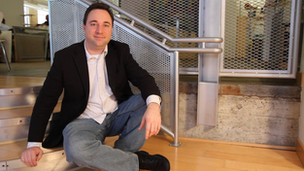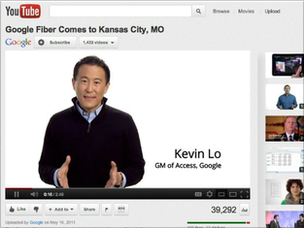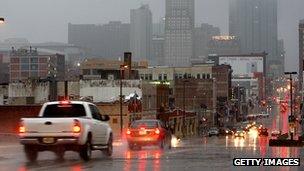Google Fiber: Can ultra-fast internet change a city?
- Published
People in Kansas City discuss arrival of ultra-fast internet
Google is installing super-fast fibre optic internet service in Kansas City. Will it usher in a new era in industry and society - or just enable faster web browsing and media downloads?
For technology consultant Bret Rhodus, Google's newest venture is an amazing business opportunity.
"This can be a game-changer," he says. "The opportunity for entrepreneurs is significant."
For art supply clerk Danni Parelman, however, it's just a chance to download more music.
The California internet giant has begun installing fibre optic cable that will give Kansas City residents download speeds of up to 1Gbps - about 100 times faster than the broadband internet service currently available to most Americans.
'The future'?

Danni Parelman says the high speed internet will enable her to download music faster
In dozens of interviews in the streets, shops, offices and cafes of Kansas City - a metropolitan area that straddles the Kansas-Missouri state line - residents and business people agreed that the project would be great for the town.
Analysts say the project, called Google Fiber, is the future of the web.
But the speed will be so much faster than what is currently available that even people familiar with the concept have a hard time imagining how it will affect industries and lives.
Although the seeds of the internet germinated in US Department of Defense laboratories and many of the most innovative internet companies are based in the US, Americans have far slower internet than residents of many other industrialised nations.
The average broadband internet speed across the US is 12.84 Mbps, according to Netindex.com. That makes the US 31st in the world (the UK is 32nd with 12.4 Mbps speed).
The ultra-high-speed unleashed by the fibre optic technology is a natural progression in the development of America's telecommunications infrastructure, says Aaron Deacon, a member of the board of the Social Media Club of Kansas City and a technology marketing consultant.
"This is the way the world is heading," he says.
"There are other places around the world that have this kind of connectivity, but around the US adoption has been pretty slow."
Uncertain impact
But what will be super-fast internet's affect on the town in practical terms?

Aaron Deacon says: "Being the first for a new infrastructure is kind of a double-edged sword"
At first, the ultra-high-speed could simply mean people use the same web sites and internet services they already do, just faster.
"People say, 'oh it's going to just be faster YouTube'. It's sort of a joke," says Mr Deacon.
"But actually to have fast YouTube and videos with no buffering, and instantaneous downloading of feature movies, is a pretty significant change in the way that video can work."
The high speed will enable small businesses and home-office workers to have high-definition video conferencing without the hiccups, lag-time, and buffering slogs frequently suffered with cable or DSL broadbased.
It will allow greater use of cloud computing by small businesses, for example by allowing them to keep customer databases and accounting systems online instead of in costly local servers.
"Once business people can collaborate and work together and they don't have to worry about lag times - when you're not frustrated with the limitations of internet speeds - things really start jiving and amazing things get done," says Dave Greenbaum owner of a Kansas City computer repair company, who predicts a burst of small business innovation.
Aside from the expected boon to businesses, analysts predict almost every aspect of people's personal lives could be affected.
Having affordable super-fast internet in the home will enable faster and more efficient telecommuting, which could take cars off the roads, analysts say.
Holograms and MRIs
Doctors and hospitals will more easily be able to transmit data-heavy medical images like MRI scans. Businesses or local governments could install "dumb terminals" - computers with little more than a screen, keyboard, mouse and internet connection - across the city.
Communities could establish shared music, film and e-book libraries. High definition - even holographic - video conferencing could enable greater participation in local government: "Town hall in the home" is one catchphrase. Public safety could be improved by higher definition CCTV and video emergency calling.
Elsewhere in the US, an electric power firm in Chattanooga, Tennessee now offers 1Gbps internet to its customers - the broadest community-wide rollout of fiber optic connectivity in the nation.
But with its high cost for residential customers - about $350 (£223) a month - only nine have signed up, says EPB's spokeswoman Danna Bailey.
"It's not going to happen overnight," she says.
"It's a bit of a curiosity."

Google published web videos and a blog promoting its service to Kansas City residents
And in Britain, BT says it will begin offering 300Mbps - less than one-third of Google Fiber's advertised speed - in 2013.
Shift to wifi
Despite the overwhelming enthusiasm in Kansas City for Google Fiber, people familiar with it warn of potential pitfalls.
"Being the first for a new infrastructure is kind of a double-edged sword," Mr Deacon says.
"It can be a really great thing, and it can build a leadership position around that, but you're also sort of a guinea pig, so if you're not smart about how you use that opportunity you can be the bad example that somebody else learns from."
Since Google first announced plans to install the fibre network in 2010, internet users' attention has shifted away from desktop internet to mobile internet, as consumers spend more and more time on smart phones, tablets and other mobile devices, says Ed Malecki, a professor of geography at Ohio State University who studies technology and economic development.
As mobile providers tighten up on cellular data use, consumers will have greater need for high-speed wifi where ever they go in their home towns, he says.

Residents said they hoped the project would help Kansas City outgrow its reputation as a "cow town"
"If Google wants to make super-fast community wifi, fine," he says. Google fiber is "not going to help anybody unless it's translated into wifi."
Meanwhile, Ms Bailey of EPB notes past world-changing technologies took years to have a broader impact.
"When electric power first became widely available in homes, it was a more convenient, somewhat novel alternative to the oil lamp for lighting," she says.
"At that time, it would have taken an incredible visionary to predict what kind of an impact electric power would have on business and ultimately quality of life."